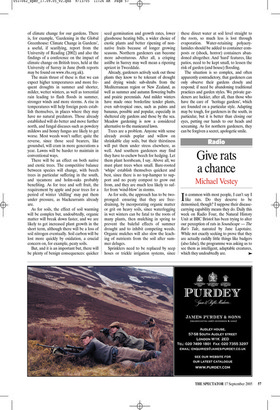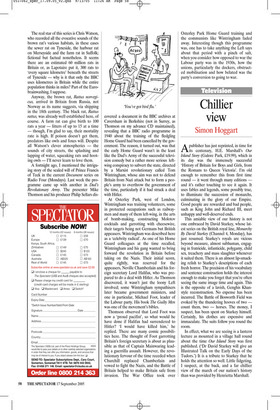Give rats a chance
Michael Vestey
In common with most people, I can’t say I like rats. Do they deserve to be demonised, though? I suppose their diseasecarrying capability means they do. Daily this week on Radio Four, the Natural History Unit at BBC Bristol has been trying to alter our perception of rats in Soundscape — The Rat’s Tale, narrated by Jane Lapotaire. While not exactly seeking to prove that they are actually cuddly little things like badgers (also false), the programme was asking us to see them as intelligent, adaptable creatures, which they undoubtedly are. The real star of this series is Chris Watson, who recorded all the evocative sounds of the brown rat’s various habitats, in these cases the sewer rat on Tyneside, the harbour rat on Merseyside and the farm rat in Suffolk; fictional but factual nonetheless. It seems there are an estimated 60 million rats in Britain or, as Lapotaire put it, 300 rats to ‘every square kilometre’ beneath the streets of Tyneside — why is it that only the BBC uses kilometres in Britain while the entire population thinks in miles? Part of the Eurobrainwashing, I suppose.
Anyway, the brown rat, Rattus norvegicus, arrived in Britain from Russia, not Norway as its name suggests, via shipping in the 18th century. The black rat, Rattus rattus, was already well established here, of course. A farm rat can give birth to 100 rats a year — litters of up to 15 at a time — though, I’m glad to say, their mortality rate is high. If poison doesn’t get them, predators like owls and foxes will. Despite all Watson’s clever atmospherics — the sounds of city streets, the splashing and lapping of water, squeaking rats and hooting owls — I’ll never learn to love them.
A fortnight ago, I mentioned the intriguing story of the sealed will of Prince Francis of Teck in the current Document series on Radio Four (Mondays). Last week the programme came up with another in Dad’s Revolutionary Army. The presenter Mike Thomson and his producer Philip Sellars dis covered a document in the BBC archives at Caversham in Berkshire (not in Surrey, as Thomson on my advance CD maintained), revealing that a BBC radio programme in 1940 about the training of the fledgling Home Guard had been cancelled by the government. The reason, it turned out, was that the early Home Guard wasn’t in the least like the Dad’s Army of the successful television comedy but a rather more serious leftwing conspiracy to subvert the state, directed by a Marxist revolutionary called Tom Wintringham, whose aim was not to defend Britain from Nazi attack but to form a people’s army to overthrow the government of the time, particularly if it had struck a deal with Hitler.
At Osterley Park, west of London, Wintringham was training volunteers, some in protected occupations such as railwaymen and many of them left-wing, in the arts of bomb-making, constructing Molotov cocktails and garrotting with cheesewire, their targets being not Germans but British appeasers. Wintringham was described here as a ‘celebrity radical’. As one of his Home Guard colleagues at the time recalled, Wintringham and his gang wanted to bring forward the revolution in Britain before taking on the Nazis. Their initial scorn, quite rightly, was reserved for the appeasers, Neville Chamberlain and his foreign secretary Lord Halifax, who was prepared to do a deal with Hitler. As Thomson discovered, it wasn’t just the loony Left involved; some Wintringham sympathisers later became government ministers, and one in particular, Michael Foot, leader of the Labour party. His book The Guilty Men was one of the movement’s bibles.
Thomson observed that Lord Foot was now a ‘proud pacifist’, so what would he have done if Halifax had surrendered to Hitler? ‘I would have killed him,’ he replied. There are many comic possibilities here. The thought of Foot garrotting Britain’s foreign secretary is about as plausible as that of Captain Mainwaring leading a guerrilla assault. However, the revolutionary fervour of the time receded when Churchill replaced Chamberlain and vowed to fight the Nazis, and the Battle of Britain helped to make Britain safe from invasion. The War Office took over




















































 Previous page
Previous page